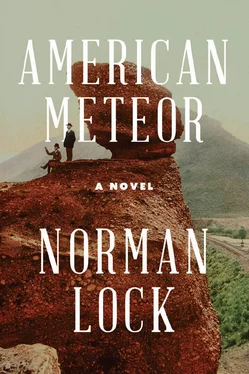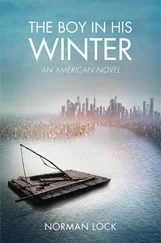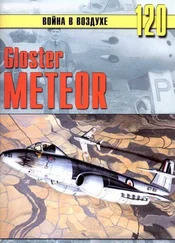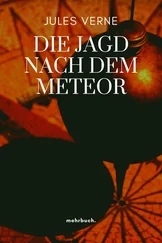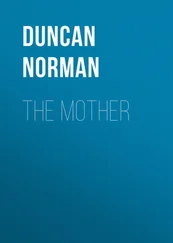The Hundredth Meridian, Nebraska Territory, October 20, 1866
At the hundredth meridian, I met a woman who must not have read Paul’s Letter to the Ephesians concerning submission and obedience: She bent for nobody and did what she pleased. A train had been made up to carry dignitaries, newspaper writers, and eastern moneymen to the Union Pacific’s latest railhead, two hundred and fifty miles west of Omaha. Durant and his gang, installed like sultans aboard the old Lincoln car, rode west with a haughty, high-toned chef from Frisco to fry their steaks and me to serve the whiskey. After nearly a year’s swanning up and down the line in my white suit, I had learned how to glare critically at the silverware, polish the crystal glasses, dust the shoulders of the bottles, and dance in attendance, like a monkey on a stick. I was a self-satisfied mug whose throat would have been cut in the Five Points just to put my nose out of joint. What else could you expect of someone who finds himself by divine accident in the midst of fabulous wealth and power? I didn’t fall into temptation so much as hurl myself at it. It was my Gilded Age, however brief.
While the barons made speeches, heard their vision and industry praised by a pack of bootlickers, and postured for the photographers, heads behind drapes to immortalize this great milestone on the way to Utah, I ogled a redhead in boots and a lumberman’s coat buttoned over a blue satin dress. I remember her name! Kari Lund. She and her father operated a traveling store in a prairie wagon they’d driven from St. Louis. They rattled up and down the lengthening track, selling whiskey, tobacco, corned beef, potatoes, and sundries. Old man Lund could also barber and shave a man, if any required tonsorial attention. But the Irish were not overly fastidious out of doors, and the coolies, who liked to be clean and tidy, were forbidden to cut their pigtails on pain of death, should they ever return shorn to China. Foreigners have their ways; we have ours.
Kari was not impressed by my milk white uniform or my Medal of Honor. I don’t think she thought much of me. She was a head taller, and her body outside of her clothes had a rude good health mine never did. Maybe she liked my face. Maybe she was bored. In any case, she let me have her in what passed for a bedroom inside the wagon while Papa Elof was away with the horses, replenishing the stock. It cannot be said that I “took her”; she’d have broken my nose for me had I tried. The experience surpassed my clumsy initiation in the chaplains’ crib and the sad wreck I’d made of desire in Chicago. Love would always be an ordeal, although I would look for it, like everyone else. Maybe I’d kept company with death too long during that twelve-day journey to the grave to find it. Despite her grit, Kari was gentle while we grappled and cleaved. She might have seen herself a missionary, bringing the comforts of her ample body to men lost and baffled by yearning on the vast plains. Most men are no better than godforsaken heathens.
When the quilt slipped from her breasts, I was startled by their soft, round fullness, so unfamiliar in that harsh country. Our skins blushed in the wavering light from the stove. The heat was luxurious. I felt a motion in my arms and legs as a river must when its ice begins to thaw. I exulted in the moment, however unreal. I knew enough of life to realize its brevity and the transience of both its pains and pleasures. We lay there while night sealed the prairie with a chill silence, its stars obedient to an ancient rule, their commotion heard only by dogs howling in the midst of a godless solitude. In their private car, warmed by brandy and cigars, Durant’s gang plotted to carve up the emptiness to their own advantage. So I imagined. From what I knew of their kind, my guess was a good one.
Greed is not exclusive to empire builders like Durant, who believed it a necessary vice if civilization was to take root and thrive. After Mr. Lincoln was murdered, Ford’s Theatre was stripped of its seats by profiteers whose ambition did not encompass territories, but only what could be carted off in a wagon or two. I suppose, in my own modest way, I was ambitious for a larger life. I was enamored of myself each time I put on that ridiculous white uniform. I enjoyed rich men’s company. I must have flattered myself a kind of soldier sent into the land of plenty to steal as much as he could carry, like one of Sherman’s “bummers” during his ardent march to the sea. I filched their cigars, liquor, tinned meat, buffalo tongue, and oysters. Being among them as they crossed their immense kingdom, surrounded by money and luxury, I must have believed something of theirs would rub off. I’m almost sure that is how it was for me. I fancied myself an up-and-comer. Afterward, when I was no longer a steward and was once more surrounded by ordinary men, I lost my self-importance. I do owe my rich and powerful patron one thing, however: my infatuation with photography, which commenced on that cold October morning on the hundredth meridian.
Three shrill blasts of the locomotive’s whistle woke Kari and me, the wild dogs in their holes, and the pig in its mire beside the wagon. We dressed and went outside while the eastern stars were giving way to the lightening sky. A photographer had set up his camera to capture the train’s departure on a wet-glass plate. During the ceremony, my mind had been elsewhere, but as he handled the maple box and its brass cylinder, my interest grew. I asked how it worked; he mumbled a gruff reply from under the curtain. He was too preoccupied, or hungover, or the day far too early to satisfy my curiosity.
Kari insisted he take our picture. He withdrew his head from behind the curtain and — liking the look of her, I guess — agreed. I kept it with me until I lost my wallet at the Little Bighorn. She stood upright and stiff, as was the custom for portraits of the time. You couldn’t tell her hair was red, of course. But her face managed to relax during the exposure. She almost smiled. In the last instant before the photographer covered the lens, I turned my head, wanting to see her handsome profile, her slightly parted lips revealing a tooth. In the picture, my face was blurred. Durant and his chums were waiting on the car’s rear platform, where I had stood, often at night, with Jericho to play taps for a man whom I’d never heard speak. There was no time to take a second photograph of a lovesick boy.
I don’t recall what Kari and I said to each other. Nothing of consequence. Until now, I haven’t been a man to unburden himself. What lay deep stayed deep. I was with her for a brief time, is all, like Odysseus in the arms of Circe, forgetting his way home. Only I had none. Lovesick! I was always ready to give my heart, yet I would never have given it entirely. Something in me wanted to keep itself secret and apart. Unless at my core, there was nothing to give.
Feeling Kari’s heat when we lay together, I recalled the winter nights when my mother had taken me into bed beside her to stop me from shivering. She was thin and had little heat to spare. I was glad she hadn’t died of consumption: I would have blamed myself for stealing her vitality, as a cat is said to steal a baby’s breath. She always feared a Brooklyn pauper’s grave.
“I want to be buried in the cemetery at Dún Laoghaire,” she used to say.
She ended among the destitute on Ward’s Island. Did these morbid thoughts turn on my mind’s lathe during the night in Kari’s wagon, or is the recollection of that night darkened now by what I found on my return to Omaha?
“Did you enjoy the lady?” Reynolds asked while I poured him his favorite whiskey.
He was one of the moneybags, for whom I had a special loathing. He leered sufficiently to make me almost forget myself. His mockery twisted suddenly into a challenge. He fixed me with his coldest stare and waited for my reply.
Читать дальше
